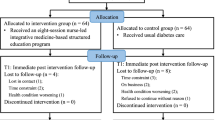Abstract
Aim: To verify if Group Care, a model to manage Type 2 diabetes (T2DM) by systemic continuing group education, can be administered by nurses and dieticians under pedagogic guidance, and improve metabolic control, quality of life, Locus of Control, and insulin resistance. Material and subjects: Twenty-five patients with non-insulin-treated T2DM were randomized to Group Care and 24 to continued habitual individual care and education delivered by a diabetes specialist and pedagogist, respectively. Six nurses and 1 dietician received training by an accredited programme, a detailed operating manual and pedagogical supervision throughout the study. Follow-up was for 2 yr and included measurements of fasting blood glucose, glycated hemoglobin (HbA1c), body mass index, waist circumference, lipids, creatinine, blood pressure, serum insulin, homeostasis model assessment (HOMA) index of insulin resistance, health behaviors, quality of life, state and trait anxiety, and Locus of Control. Results: One patient on Group Care and 3 controls dropped out. At the end of study, the patients on Group Care had lower HbA1c (7.6± 0.8 vs 8.4± 1.3, p<0.05), insulin (18.0± 9.6 vs 24.3± 13.7, p<0.001), HOMA index (6.9± 5.4 vs 9.2± 6.6, p<0.05), and fatalistic attitude (17.2± 5.9 vs 24.9± 4.2, p<0.001) and better quality of life (65.0± 11.0 vs 78.4± 19.6, p<0.001) than controls. Conclusions: Group Care delivered by trained nurses and dietitan is associated with better outcomes than those obtained by a medically and pedagogically qualified team. It may offer a model for health operators to re-organize clinical practice and for patients to improve lifestyle and strengthen the therapeutic alliance with their carers.
Similar content being viewed by others
References
Norris S, Engelgau MM, Narayan KM. Effectiveness of self-management training in type 2 diabetes. Diabetes Care 2001, 24: 561–87.
Norris SL, Lau J, Smith SJ, Schmid CH, Engelgau MM. Self-management education for adults with type 2 diabetes: a meta-analysis of the effect on glycemic control. Diabetes Care 2002, 25: 1159–71.
Van Dam HA, Van der Horst F, Van den Borne B, Ryckman R, Crebolder H. Provider-patient interaction in diabetes care: effects on patient self-care and outcomes. A systematic review. Patient Educ Couns 2003, 51: 17–28.
Vermeire E, Wens J, Van Royen P, Biot Y, Hearnshaw H, Lindenmeyer A. Interventions for improving adherence to treatment recommendations in people with Type 2 diabetes mellitus. Cochrane Database Syst Rev 2005: CD003638.
Fisher EB, Thorpe CT, Devellis BM, Devellis RF. Healthy coping, negative emotions, and diabetes management: a systematic review and appraisal. Diabetes Educ 2007, 33: 1080–103.
Trento M, Passera P, Bajardi M, et al. Lifestyle intervention by group care prevents deterioration of type 2 diabetes: a 4-year randomized controlled clinical trial. Diabetologia 2002, 45: 1231–9.
Trento M, Passera P, Borgo E, et al. A 5-year randomized controlled study of learning, problem solving ability, and quality of life modifications in people with type 2 diabetes managed by group care. Diabetes Care 2004; 27: 670–675.
Trento M, Passera P, Miselli V, et al. Evaluation of the locus of control in patients with type 2 diabetes after long-term management by group care. Diabetes Metab 2006, 32: 77–81.
World Medical Association declaration of Helsinki. Recommendations guiding physicians in biomedical research involving human subjects. JAMA 1997, 277: 925–6.
Matthews DR, Hosker JP, Rudenski AS, Naylor BA, Treacher DF, Turner RC. Homeostasis model assessment: insulin resistance and beta-cell function from fasting plasma glucose and insulin concentrations in man. Diabetologia 1985, 28: 412–9.
Reliability and validity of a diabetes quality-of-life measure for the Diabetes Control and Complications Trial (DCCT). The DCCT Research Group. Diabetes Care 1998, 11: 725–32.
Spielberg CD, Gorsuch RL, Lushene RE. The state-trait anxiety inventory (STAI). Test manual X form consulting psycologist. Palo Alto, CA: Consulting Psychologist Press, 1970.
Peyrot M, Rubin RR. Structure and correlates of diabetes-specific locus of control. Diabetes Care 1994, 17: 994–1001.
Newman P, Peile E. Valuing learner’s experience and supporting further growth: educational models to help experienced adult learners in medicine. BMJ 2002, 325: 200–2.
Grant RW, Buse JB, Meigs JB; University Health System Consortium (UHC) Diabetes Benchmarking Project Team. Quality of diabetes care in U.S. academic medical centers: low rates of medical regimen change. Diabetes Care 2005, 28: 337–442.
Prévost G, Phan TM, Mounier-Vehier C, Fontaine P. Control of cardiovascular risk factors in patients with type 2 diabetes and hypertension in a French national study (Phenomen). Diabetes Metab 2005,31: 479–85.
Rowlands G, Sims J, Kerry S. A lesson learnt: the importance of modelling in randomised controlled trials for complex interventions in primary care. Fam Pract 2005, 22: 132–9.
Funnell MM, Brown TL, Childs BP, et al. National standards for diabetes self-management education. Diabetes Care 2008, 31: S97–104.
Author information
Authors and Affiliations
Corresponding author
Rights and permissions
About this article
Cite this article
Trento, M., Basile, M., Borgo, E. et al. A randomised controlled clinical trial of nurse-, dietitian- and pedagogistled Group Care for the management of Type 2 diabetes. J Endocrinol Invest 31, 1038–1042 (2008). https://doi.org/10.1007/BF03345645
Accepted:
Published:
Issue Date:
DOI: https://doi.org/10.1007/BF03345645




